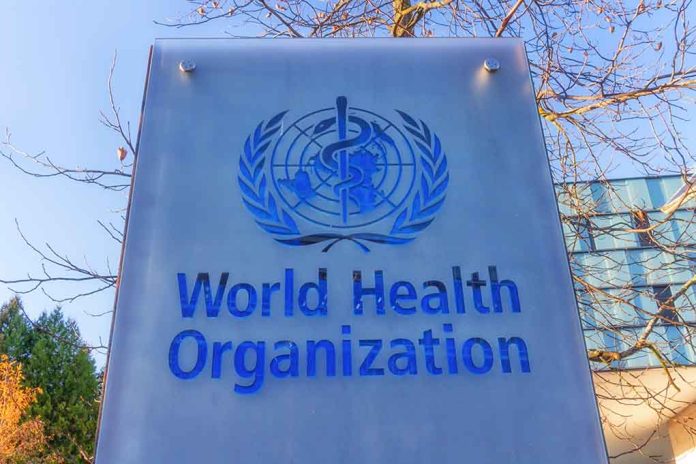
The World Health Organization continues to bow to Chinese Communist Party pressure by excluding Taiwan from the World Health Assembly, despite the island nation’s exemplary health system and the absence of any legitimate legal basis for their exclusion.
Key Takeaways
- Taiwanese officials and community leaders in California held a press conference on May 3 urging WHO to include Taiwan in the upcoming World Health Assembly (May 19-27).
- Taiwan has been excluded from WHO participation since 2017 solely due to political pressure from the Chinese Communist Party.
- Neither UN Resolution 2758 nor WHA Resolution WHA25.1 authorizes China to represent Taiwan in the WHO.
- Taiwan has implemented universal health coverage since 1995, achieving a coverage rate exceeding 99.9%, demonstrating its healthcare expertise.
- President Trump initiated U.S. withdrawal from the WHO, citing its political compromise and mishandling of the COVID-19 outbreak.
Communist China’s Illegitimate Blockade of Taiwan at WHO
Taiwan has been systematically excluded from the World Health Assembly since 2017, not because of any legitimate international law, but solely due to political pressure exerted by the Chinese Communist Party. On May 3, Taiwanese officials and community leaders in Northern California gathered at the Culture Center of the San Francisco Taipei Economic and Cultural Office (TECO) in Milpitas to challenge this unjust exclusion ahead of the 78th World Health Assembly scheduled for May 19–27 in Geneva.
“China has long distorted U.N. General Assembly Resolution 2758 and WHA Resolution WHA25.1 on the international stage. Neither resolution mentions Taiwan or states that Taiwan is part of China. Nor do they authorize the People’s Republic of China to represent Taiwan in the WHO,” Jenny Guo
The press conference participants systematically dismantled Beijing’s false narrative that Taiwan falls under Chinese authority in international organizations. Resolution 2758, passed in 1971, merely recognized the People’s Republic of China as China’s representative at the UN but made no determination whatsoever regarding Taiwan’s status. The Taiwan International Solidarity Act (H.R.1176), introduced in the U.S. Congress in 2023, further clarifies that Resolution 2758 does not address Taiwan’s representation or sovereignty in any way.
Taiwan’s World-Class Healthcare System Sidelined
While global health bureaucrats play politics, they’re deliberately sidelining one of the world’s most effective healthcare systems. Taiwan has implemented universal health coverage since 1995, achieving a remarkable coverage rate exceeding 99.9% of its population. This impressive system, along with Taiwan’s demonstrated success in pandemic management, should make it an invaluable contributor to global health discussions rather than an excluded party.
Sophia Chuang from the Culture Center emphasized that health is a fundamental human right and criticized the WHO for being compromised by political pressure from China. The continued exclusion of Taiwan’s 23 million citizens from representation in global health governance represents a significant gap in the WHO’s claim of universal health cooperation. Despite Taiwan’s obvious contributions to global health knowledge, the organization allows communist China to dictate who can participate.
America’s Growing Distrust of WHO
The WHO’s politicization has not gone unnoticed by American leadership. President Donald Trump announced the United States’ withdrawal from the WHO on January 20, citing the organization’s mishandling of the COVID-19 outbreak and its apparent capitulation to Chinese influence. This decision reflects growing frustration with international organizations that abandon their stated missions to appease authoritarian regimes.
“Resolution 2758 (XXVI) established the representatives of the Government of the People’s Republic of China as the only lawful representatives of China to the United Nations. The resolution did not address the issue of representation of Taiwan and its people in the United Nations or any related organizations, nor did the resolution take a position on the relationship between the People’s Republic of China and Taiwan or include any statement pertaining to Taiwan’s sovereignty,” Taiwan International Solidarity Act (H.R.1176)
Dr. Jiin T. Lin noted at the press conference that the U.S. withdrawal process takes a year, meaning America will still participate in the WHO this year and support Taiwan’s inclusion in the upcoming World Health Assembly. This continued American support for Taiwan comes despite heavy pressure from China to isolate the democratic island nation. In 2022, President Biden signed a law specifically directing the U.S. to support Taiwan’s observer status at the WHO.
The Cost of Politicized Global Health
The WHO’s capitulation to Chinese pressure represents a troubling pattern of international organizations abandoning their core missions to appease powerful authoritarian regimes. By excluding Taiwan, the WHO deliberately cuts itself off from valuable healthcare expertise and undermines its own stated commitment to “fully achieving the goal of health for all.” The organization’s apparent willingness to prioritize Chinese political demands over global health cooperation raises serious questions about its effectiveness and credibility.
The continued exclusion of Taiwan demonstrates how far the WHO has strayed from its founding principles. Rather than serving as a non-political forum for health cooperation, it has become yet another battleground where communist China flexes its influence to isolate Taiwan internationally. This politicization comes at a real cost to global health security and makes the WHO increasingly irrelevant as a truly universal health organization.




